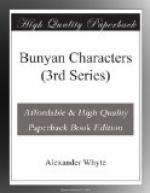The Divine Comedy is beyond dispute the greatest book of personal and experimental religion the world has ever seen. The consuming intensity of its author’s feelings about sin and holiness, the keenness and the bitterness of his remorse, and the rigour and the severity of his revenge, his superb intellect and his universal learning, all set ablaze by his splendid imagination—all that combines to make the Divine Comedy the unapproachable masterpiece it is. John Bunyan, on the other hand, had no learning to be called learning, but he had a strong and a healthy English understanding, a conscience and a heart wholly given up to the life of the best religion of his religious day, and then, by sheer dint of his sanctified and soaring imagination and his exquisite style, he stands forth the peer of the foremost men in the intellectual world. And thus it is that the great unlettered religious world possesses in John Bunyan all but all that the select and scholarly world possesses in Dante. Both Dante and Bunyan devoted their splendid gifts to the noblest of services—the service of spiritual, and especially of personal religion; but for one appreciative reader that Dante has had Bunyan has had a hundred. Happy in being so like his Master in so many things, Bunyan is happy in being like his unlettered Master in this also, that the common people hear him gladly and never weary of hearing him.
It gives by far its noblest interest to Dante’s noble book that we have Dante himself in every page of his book. Dante is taken down into Hell, he is then led up through Purgatory, and after that still up and up into the very Paradise of God. But that hell all the time is the hell that Dante had dug and darkened and kindled for himself. In the Purgatory, again, we see Dante working out his own salvation with fear and trembling, God all the time working in Dante to will and to do of His good pleasure. And then the Paradise, with all its sevenfold glory, is just that place and that life which God hath prepared for them that love Him and serve Him as Dante did. And so it is in the Holy War. John Bunyan is in the Pilgrim’s Progress, but there are more men and other men than its author in that rich and populous book, and other experiences and other attainments than his. But in the Holy War we have Bunyan himself as fully and as exclusively as we have Dante in the Divine Comedy. In the first edition of the Holy War there is a frontispiece conceived and executed after the anatomical and symbolical manner which was so common in that day, and which is to be seen at its perfection in the English edition of Jacob Behmen. The frontispiece is a full-length likeness of the author of the Holy War, with his whole soul laid open and his hidden heart ‘anatomised.’ Why, asked Wordsworth, and Matthew Arnold in our day has echoed the question—why does Homer still so live and rule without a rival in the world of letters? And they answer that it is because he always sang with his eye so fixed upon its object. ‘Homer, to thee I turn.’ And so it was with Dante. And so it was with Bunyan. Bunyan’s Holy War has its great and abiding and commanding power over us just because he composed it with his eye fixed on his own heart.




